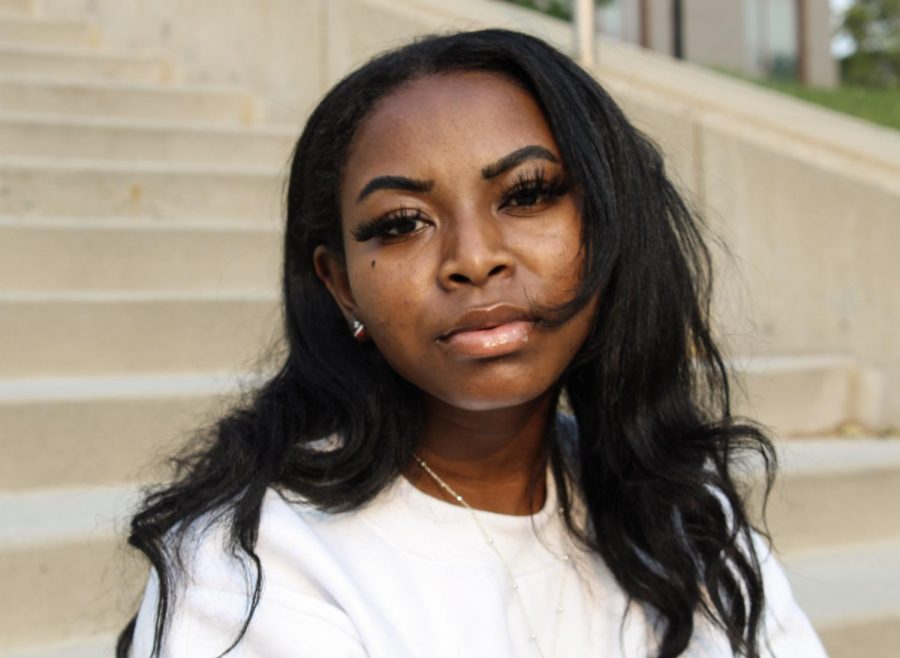BIPOC Mental Health: Resilience in the Face of Trauma
Lorna Khemchand poses at the University of Utah campus in Salt Lake City on Wednesday, Sept. 1, 2021. (Photo by Brooklyn Critchley | The Daily Utah Chronicle)
September 27, 2021
In addition to the disproportionate physical health and economic effects posed by the COVID-19 pandemic, the pandemic also disproportionately impacted the mental health of people color.
According to Mental Health America, racism is a mental health issue because it causes trauma. Data from the Centers for Disease Control and Prevention (CDC) show 12.9% of multiracial and non-Hispanic, non-white adults reported stress and worry about stigma or discrimination associated with being blamed for spreading COVID-19 as compared to 2.4% of whites.
William A. Smith, a professor in the department of education, culture and society at the University of Utah said many people of color are frontline workers — from the service industry to the medical field — and are thus facing the brunt of the pandemic.
“Many of them are in jobs that they might be the first one to get let go,” Smith said. “So they are tinged with positions where they need their income coming in, and when they don’t have children in school they might be suffering from being able to find somebody else to watch their children while they go to work.”
Smith said people of color are facing two pandemics: COVID-19 and racism.
“Many of my students were very traumatized by the George Floyd murder, at the same time the pandemic is going on, and the economic fallout,” Smith said.
Students have had little to no time to process the events of the year, hindering their experience and leading to mental health issues. Smith reported an increased amount of anxiety in his students surrounding the events of the last year.
“Everybody, students of color, white students, everyone has displayed tremendous resilience,” he said.
He depicted the ability of students to endure the events of the year and continue despite challenges.
Communities of color have been disproportionately affected by the pandemic in social, economic and emotional ways. This is partly because many essential workers come from communities of color. According to the CDC, essential workers are at a higher risk of being exposed to COVID-19.
Lorna Khemchand, a freshman at the U, said there were both negative and positive impacts of COVID-19. She expressed how her family made the most of their situation, coming together through quarantine and the stress of going back to school.
“I was shocked with how everything was happening so fast,” she said, speaking about the events of the last year with Black Lives Matter protests, COVID-19 and heightened awareness of police brutality.
Khemchand said the effects of the pandemic varied for each student during the school year.
“A lot of students have had problems with family members getting sick,” she said.
She further talked about friends who have had parents, grandparents and loved ones who have passed away due to COVID-19.
“A lot of people in neighborhoods of color lost their jobs,” Khemchand said. “If they did catch COVID it would not be good because they don’t have the money to be taken to the hospital.”
Khemchand reported peers feeling stressed to be back in school and the mental trauma of losing a loved one. She spoke of economic stress felt by people close to her with people losing their jobs, their homes and even their lives.
“A lot of people of color don’t have a lot of resources … and the rough neighborhoods have struggled a lot,” she said. “A lot of them have moved out or lost their jobs or become homeless.”
The inequity of healthcare has frustrated her, adding to the stress and suffering of this community. She described a family friend who passed away due to the lack of health resources for people of color in the United States.
“A lot of people of color are getting sick and can’t get the help that they need,” she said.
She spoke of the resilience students of color have shown throughout the year.
“I know some families who have struggled and died from COVID due to the lack of access,” she said. “Because of the lack of healthcare, he passed away, but it’s just how it is.”
She shifted tones, expressing the hope she has for the future of healthcare equity.
“We’re working on changing it, and later in the future hopefully there can be equal access,” Khemchand said.
She said she is tired of hearing news of another person of color and their family being harmed by police brutality. According to Khemchand, there is added stress and fatigue when fighting for basic human rights.
Khemchand feels strongly about this topic because a person she considered a brother lost his life to police brutality.
She recognized there is progress being made, but there is still a long way to go. “We’re making progress,” she said. “People are realizing that there are bad police in the system and people are being charged for what they have done.”









